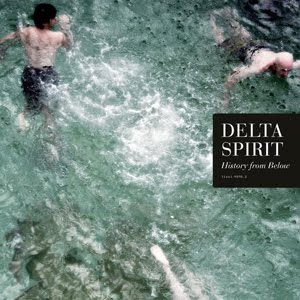Delta Spirit is one of those bands you play for your folks during a long car ride to your relative’s place. You scroll passed artists that that might spark questions like “Is this music?” from the old-timers and settle on something that seems to fit perfectly in that happy place of modern indie rock with obvious classic rock influences. History From Below kicks in and mom and dad nod their heads for a few moments before asking, “Are you sure this isn’t a Springsteen cover (even though they know full well that it isn’t)?” After a few minutes they shrug their shoulders and give a half-hearted, “It’s all right.” And strangely, despite the huge gap in taste and time between you and that generation, you know that you agree. The album is just all right.
Like Dr. Dog, The Cold War Kids and other bands that this quartet from San Diego are bound to be compared to, Delta Spirit exists on that fine line between influenced originality and emulation to a fault. To rattle off all of the obvious influences that can be spotted on History From Below would be a lengthy and fruitless endeavor, not just because of the band’s proclivity for imitating their heroes but also because of the album’s notable diversity. From start to finish, History From Below is a mixed bag that sometimes sounds like a young band yelling, “Look what I can do” into a mic. And, to be fair, Delta Spirit can do a lot pretty well.
Unlike their first full-length album, Ode to Sunshine, Delta Spirit had the benefit of a pretty sweet production process on History From Below. The album was recorded in a barn-studio frequented by Tom Waits and was produced by My Morning Jacket’s Bo Koster and Eli Thomson. The higher production value is one of the clear differences between the two albums, but the more striking and noteworthy change is the remarkable growth of lead singer, Matt Vasquez. Sometimes he sounds like a dried-out, worn-out southern porch sitter. Sometimes he sounds like a drunk and frustrated Julian Casablancas. Sometimes he sounds like a sweet voiced choirboy who’s had the shit kicked out of him. The constant is that he’s always the standout. Always. And he’s what prevents this ambitious album from falling totally flat.
Tracks such as “White Table” and “Bushwick Blues” are examples of the band at their best. They are percussion driven anthems that do a good job of showcasing the band’s greatest asset, Vasquez. But the thing about Delta Spirit is that they are a band that has made a name for themselves by touring like crazy (try 290 shows in 2009) and getting really good at it. I drank the Kool-Aid at a concert when they played the old “Animal House” theme song, “Shout,” and got a couple thousand people to get on the floor as they whispered, “A little bit softer now, a little bit softer now.” They truly put on a good show. The problem is that History From Below is an album crafted to be successful on a small stage or around a campfire, not in your headphones or in the car with your parents.
Lyrically, Delta Spirit can be strangely immature and painfully overt. When they sing in cliché, it doesn’t feel deserved. When they lighten things up, it feels trivial. On their pop-ode-to-California, “Golden State” Vasquez joyfully belts, “Good friends remain/ Even though the pain/ Of the long road ahead.” On the darker and confused “Salt in the Wound,” Vasquez basically paraphrases “Are you there, God? It’s me, Margaret” from the perspective of a guy in his twenties. It’s as if Delta Spirit hasn’t yet figured out what kind of songwriters they want to be and the result is a lot of half-baked lyrics that exist in this purgatorial state between thoughtful and thoughtless, polished and raw.
With that said, credit to Delta Spirit for making what can only be described as a ballsy album. History From Below attempts to succeed in several different genres, but also master its foundation in southern-souled indie rock. It attempts to be important and political, but also tries to have a good time. It attempts to balance careful musical composition with inspired spontaneity. But the result of all these ideas and ambitions is an album that is surely decent fun, but easily forgettable. With Vasquez’s voice and a band made up of talented and seemingly thoughtful musicians, you’d think Delta Spirit would be capable of a more original and cohesive album that doesn’t feels like a collection of eleven songs decided upon five minutes before show time.

